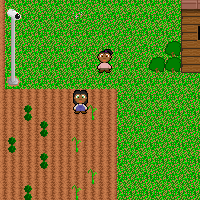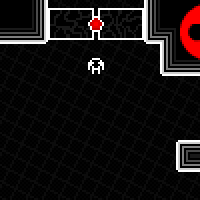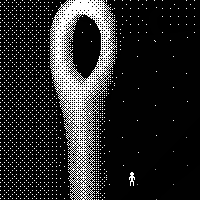Adobe recently resurrected their Packager for iPhone, which takes a Flash or Air program and turns it into an iPhone app. I’ve been trying it out by converting an old game of mine. I’ve made progress, but I’ve had some struggles.
Continue reading Flash to iPhone Struggles
Category Archives: Digital Games
“The Day” Released

I just released “The Day” on ArmorGames.com. It’s a game about birthdays, trading cards, and war.
It’s Tia’s birthday, and she’s looking forward to beating all of her friends with the new card her dad gave her! Beat the other kids by choosing the right cards, and earn more cards until you’re the best of them all!
And don’t go into the woods, or the guards will kill you.
The game is an experiment in orthogonal goals.
The Nature of a Masterpiece
These days, we use the word “masterpiece” to mean “a work that could only be created by a master.” Any especially good painting, game, or poem could be called a masterpiece. Originally, though, the term had a very specific meaning: a masterpiece was the work created by a craftsperson to demonstrate that she was now a master of the craft.
The craft guild educational system started with apprentices. Apprentices worked for and learned from a master. When they were finally able to earn money on their own, they usually became journeymen: craftsfolk who worked and produced good products, but weren’t officially recognized as experts. In order for the guild to recognize a craftperson as a master, she would need to make a masterpiece: a work that demonstrates her skill.
It’s interesting looking at this concept in the context of game development. Terry Cavanagh‘s masterpiece is VVVVVV. His work beforehand was excellent, but 6V demonstrated that he had a mastery of every aspect of the craft: challenge, story, managing the player’s feelings, and creating a unified feel. The concept is a little awkward to apply to teams, but it can be done; Ico was an excellent game, but it’s only with Shadow of the Colossus that Team Ico created a masterpiece.
The way I see it, a masterpiece must be perfect. I don’t mean that it must be without flaw, but it needs to be complete in every way. If there is a big piece missing, or if the work is not expansive enough to fully demonstrate mastery of the form, then it can’t be considered a masterpiece. Masterpieces are dissertations, theses, graduation projects: they are evidence of the creator’s skill and control over the totality of the craft.
It’s fun to play a game to decide on masterpieces for various creators. Frictional Games have Amnesia: The Dark Descent. Jonas Kyratzes has Phenomenon 32, a great example of a perfect masterpiece that still has flaws. Valve has Half-Life 2… or maybe one of the episodes? Or maybe some other game entirely, depending on your opinion. Personally, I don’t think Anna “Auntie Pixelante” Anthropy has made her masterpiece yet, although REDDER comes close.
As for me, I know I haven’t produced a masterpiece yet. I’m still a journeyman. I have been thinking lately about what I could do for a masterpiece, though. I’ve got one tempting idea involving survival in a warzone without weapons.
Do you disagree with any of my choices for masterpieces? Do you want to suggest candidates for other creators? Please comment with your ideas.
Ludus Novus 020: Acceptable Losses

In this episode of the Ludus Novus podcast, I discuss the basic minion summoning and equipment mechanics of Overlord, and how they both encourage tactical gameplay and maintain the characterization of the player character.
The music for this episode is from “medieval evil” by Baal Anamelech and is available under a Creative Commons Attribution-Sharealike 3.0 license.
Fundraising
I’m thinking of doing something to bring in a bit of extra money, as things are a bit tight at the moment. One option is to sell a CD-ROM printed-on-demand containing all of my already-released games. My sponsorship agreements would allow me to do so if the games were “site-locked” to only run on a player’s own computer. I’d also make the games ad-free, of course. I could possibly offer source code, although I’d have to do something to protect my sponsors’ investment; the first thing that comes to mind would be including source code but no assets, so that the games could be examined but not easily compiled.
I could also do the same thing, but not on a physical CD; buyers would just get a DRM-free download containing the games.
Would any of the visitors to this blog be interested in some sort of merchandise along these lines? Any special requests or suggestions? Any ideas as to an appropriate price point?
[EDIT: Trythil raised a question in the comments that I should address. Games wouldn’t be locked to a specific computer; they would just be prohibited from being hosted online. Specifically, some of my sponsorship agreements require advertising to be included in any widely-distributed version, and I don’t want to force paying users to watch ads. I also should have said that I’d personally like to make sure ad-free versions don’t get hosted on portals, as that would mean I wouldn’t make money off of it. Whether you consider this “DRM” is up to you; it probably technically falls under the definition of the word. However, the package would contain no digital restrictions on copying or distribution, which is what most people think of when they say “DRM.” This release would not be offered under a CC or otherwise copyleft license, so ethical restrictions would still apply to certain kinds of copying. I don’t believe in enforcing those restrictions, though.]
“Narthex” Released

I’ve finished up a little game that’s partially a test for a conversation engine I cooked up. It’s called “Narthex.”
After a long journey, you will reach the Narthex, the waiting place before the oracle. There you must wait until your time. Then you will be given the answer to a single question. This game has two endings. The second is not worth getting.
Play “Narthex” at Ludus Novus.
Looming Released
 My latest game, Looming, is up at Newgrounds. Looming is a game about… well.
My latest game, Looming, is up at Newgrounds. Looming is a game about… well.
This game is about two lovers named January and September.
No, wait; it’s about a group of people who don’t believe in the sky.
No, it’s about a pantheon of scientific disciplines.
Or maybe it’s about an ancient beast who knew exactly when it was going to die, and how.It’s about a place. A place called Looming.
Play Looming on Newgrounds.
Continue reading Looming Released
One Measure of Bit.Trip Runner
The other night, I picked up Gaijin Games’s Bit.Trip Runner for WiiWare. This game is the best example of pure, brilliant game design that I’ve seen in a good while. This is the game designer as teacher and leader; it’s what Anna Anthropy calls design as sadism:
As a designer and as a domme, I want the person who submits to me to suffer and to struggle but ultimately to endure: I challenge her while simultaneously guiding her through that challenge. The rules of the game and the level design carry that idea.
Runner does this through the gradual layering of new game elements, high challenge with low punishment, and optional bonus goals. Most of all, though, it guides through repetition. This is a game about rhythm, after all. For my favorite example of this, let’s look at a single measure of rhythm from the game, no longer than 2 seconds, that appears everywhere.
Continue reading One Measure of Bit.Trip Runner
Two Stories
For those who are interested in mixing linear prose and poetry with gaming, there’s a project that looks very interesting: “Moon Taxi,” brought to my attention by GameSetWatch. “Moon Taxi” is a game for Xbox Live Indie Games (not PC, sadly) where you play a taxi driver to the moon. Your passengers tell stories, some submitted by fans, and important words in those stories appear in front of you as you hear them. It looks very cool; a creative writing prompt and a clever way to approach storytelling all at once. Check out the recruitment video for another view at the game and a pretty funny monologue.

And for those curious about my work, my next game is almost done.
It’s about two lovers named January and September.
No, wait, it’s about a group of people who don’t believe in the sky.
No, it’s about a pantheon of scientific disciplines.
Or maybe it’s about an ancient beast who knew exactly when it was going to die, and how.
It’s about a place. A place called Looming.
Phenomenon 32 and the Cinders of Earth

I’ve been playing a game lately about exploring a place where a man-made disaster has bent the very fabric of reality itself, creating bizarre anomalies and strange creatures. I explore the abandoned remnants of cities and laboratories, scrabbling for resources and seeking answers to the nature of the disaster.
This game is so good, it’s distracted me from playing STALKER.
Jonas Kyratzes‘s new game Phenomenon 32 has a similar setting to GSC Game World‘s Chernobyl shooter: the familiar modern world, distorted by the folly of science unbounded by ethics into a place where the very rules of reality can’t be trusted. This isn’t a new premise: STALKER is indirectly based on the 1972 novel Roadside Picnic, and the seminal work for this concept is probably the “Dying Earth” series. It’s sheer coincidence that I was playing these two games at the same time, but there are several good reasons why Phenomenon 32 is winning out.
Continue reading Phenomenon 32 and the Cinders of Earth